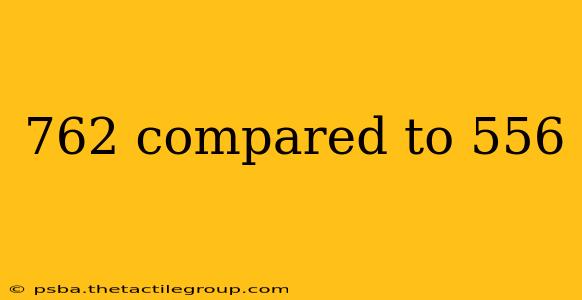762 vs. 556: A Comprehensive Comparison of Popular Calibers
The world of firearms boasts a vast array of calibers, each with its own strengths and weaknesses. Two calibers frequently compared are the 7.62x51mm NATO (.308 Winchester) and the 5.56x45mm NATO (.223 Remington). This comparison delves into the key differences between these rounds, helping you understand which might be better suited for your needs.
Understanding the Basics:
Both 7.62x51mm and 5.56x45mm are widely used rifle cartridges, adopted by militaries and civilians alike. However, their design and performance characteristics differ significantly.
Caliber: Size and Power
-
7.62x51mm NATO (.308 Winchester): This larger caliber round is known for its substantial power and stopping power. Its heavier bullet delivers more kinetic energy, making it effective at longer ranges and against larger targets.
-
5.56x45mm NATO (.223 Remington): This smaller caliber round prioritizes velocity and rate of fire. While possessing less stopping power than the 7.62x51mm, its lighter bullet travels faster, offering flatter trajectory and less drop over distance.
Ballistics and Range:
-
7.62x51mm: Demonstrates superior accuracy and effective range. The heavier bullet maintains energy over longer distances, making it suitable for precision shooting and hunting larger game.
-
5.56x45mm: Exhibits a flatter trajectory at shorter to medium ranges, making it suitable for rapid engagement in close-quarters combat (CQB) scenarios. While it can reach longer ranges, the energy drop-off is more pronounced than with 7.62x51mm.
Recoil and Handling:
-
7.62x51mm: The larger caliber produces considerably more recoil. This can be manageable with practice but requires more physical strength and control, potentially affecting accuracy for less experienced shooters.
-
5.56x45mm: Recoil is significantly less noticeable, allowing for quicker follow-up shots and better control during rapid firing. This makes it easier to handle, especially for newer shooters.
Ammunition Availability and Cost:
Both calibers enjoy widespread availability, with ammunition readily accessible from various manufacturers. However, 5.56x45mm ammunition is generally less expensive than 7.62x51mm.
Applications:
-
7.62x51mm: Suitable for hunting larger game, long-range shooting, tactical applications demanding substantial stopping power, and military use where penetration and effective range are paramount.
-
5.56x45mm: Ideal for self-defense, home defense, tactical scenarios requiring rapid firing, and military use where lighter weight and higher rate of fire are preferred.
Conclusion:
The choice between 7.62x51mm and 5.56x45mm hinges on intended use. 7.62x51mm excels in scenarios requiring greater power and range, while 5.56x45mm prioritizes speed, maneuverability, and ease of handling. Consider your specific needs and experience level when making your decision. Remember to always prioritize safe and responsible firearm handling practices.

